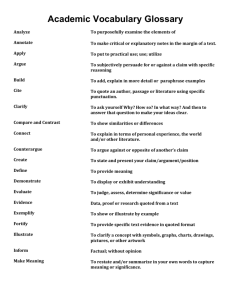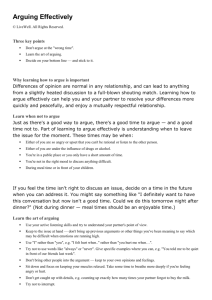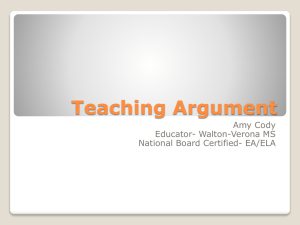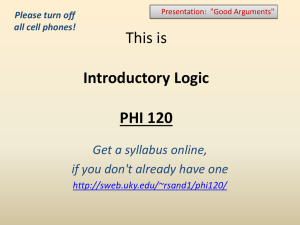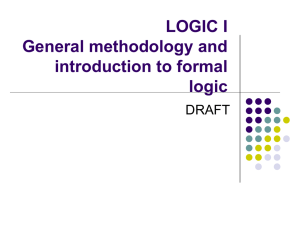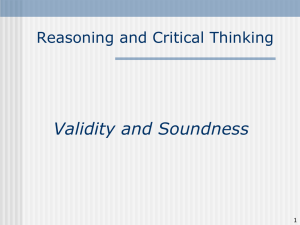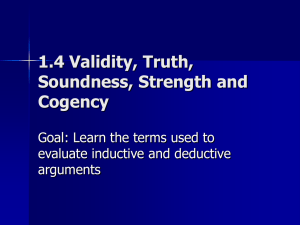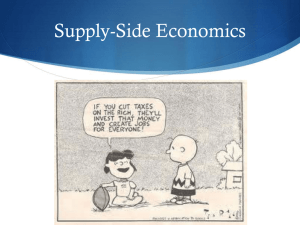Lecture 1 () - University of Sheffield
advertisement
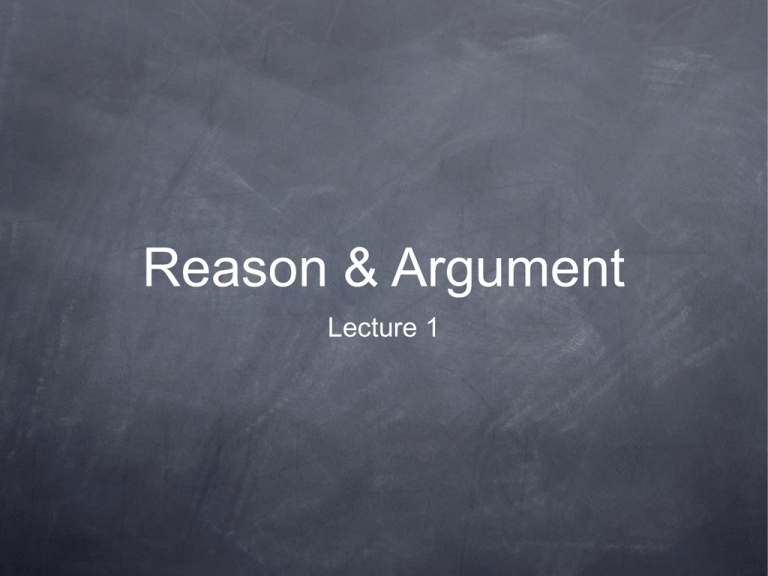
Reason & Argument Lecture 1 Lecture 1 Synopsis • Course Admin • Why is it important to Reason and Argue? • Some Key Concepts (1) Course Admin Course Webpage: http://www.shef.ac.uk/philosophy/modules/reason.html Meetings: Lecture: here & now! Except Week 7 (Writing Week) Tutorials: beginning week 3. Sign-up in the department of philosophy - Arts Tower, 12th Floor on 10th of October. (1) Course Admin Course Text: McKay, Thomas (2000) Reasons, Explanations and Decisions: Guidelines for Critical Thinking, Belmont, CA: Wadsworth/Thomson Learning. Info Commons: 160 (M), Western Bank 140 (M) or 160 (M) Or buy from Blackwell’s (Mappin Street) for £25.99 (that’s £2.16, or less than a pint a week) (1) Course Admin Assessment: One course-work assignment (50%) Deadline: 4th of December (Week 10) One exam (50%) January (between 21st Jan & 9th Feb) (2) Why Reason & Argue? Reasoning & Arguing = Critical thinking = the ability to appraise whether a given statement should be accepted for a stated range of reasons. Examples: You ought to work very hard in PHI205, because it is important to be able to think critically. (2) Why Reason & Argue? Three reasons why it is important to be able to think critically. • Because of all the decisions we have to make in our everyday lives: Which university should I attend? What career should I pursue? Should I party this evening or do some work? Which party should I vote for? (Should I bother?) (2) Why Reason & Argue? • Because it’s a really useful transferable skill! Journalists evaluate sources Politicians construct and argue for policies Lawyers make legal arguments in court Doctors diagnose patients, etc. (2) Why Reason & Argue? 3. Because it helps us to communicate with each other. I may like you better if I can understand your reasons for thinking and doing the things you do... ...and if you can understand mine. And if we don’t get along, the ability to think critically may become even more important as a means to resolve conflict. (3) Some Key Concepts Argument = a statement, along with some supposed reasons for accepting the statement. Two components of an argument: An argument’s conclusion = the statement for which reasons have supposedly been presented. An argument’s premises = the claims which are supposed to be reasons for accepting the argument’s conclusion. (3) Some Key Concepts Two arguments: • My Mum is better than your Dad, because she’s mine and he’s yours. • Jack is very unreliable: he never cooks dinner or pays his rent when he says he will. Two more arguments: • The big bad wolf has got a nasty habit of devouring children. So my daughter had better keep away from him. • A good education is a pleasant route to wisdom. Hence one who would be wise would do well to study the reasons of things. (3) Some Key Concepts One point illustrated by some of those arguments is: The order in which the parts of an argument are presented doesn’t necessarily indicate what the argument’s parts are — conclusions may be presented before premises. (3) Some Key Concepts Conclusion ‘indicators’ So... Hence... Thus... Therefore... It follows that... (3) Some Key Concepts Be careful! These terms have other uses (indicating temporal & causal connections): You dropped it, hence it smashed.. He shouted ‘Help!’ so that everyone would look at him. (3) Some Key Concepts And (just to make things more difficult) not all arguments feature these indicators: The Prime Minister is very unpopular, and his party has not used its legislative majority effectively. The opposition will make significant gains in the next election. (3) Some Key Concepts Example: ‘So’ & ‘Hence’: Conclusion indicators or not? Jeremy has a fancy new motorbike. So what? TIME magazine’s ‘Man of the Year’ for 1938 was Adolf Hitler. Hence their criteria must have been somewhat peculiar. I’ve got a right to my opinion. So has Nicholas Parsons. (3) Some Key Concepts Premise ‘indicators’ For... Since... Because... Due to the fact that... (3) Some Key Concepts ‘Because’ & ‘Since’: Premise indicator or not? Since Tuesday he has not studied. He must have passed the module, because he told me he did and he always tells the truth. Since I arrived in Sheffield, my legs have got stronger. Exercise 1A In each case, decide whether it is an argument, and if so, what are its premises and conclusion: • Flutes must use reeds, because all woodwind instruments use reeds, and flutes are woodwind instruments. • No brass instruments use reeds, and flutes don’t use reeds, so flutes must be brass instruments. Exercise 1A • After a hard day of rehearsals, John loves to sit in a quiet meadow where he can hear only the birds. • Since last summer, when he hitched around Europe playing music on the street, he takes his flute everywhere. Exercise 1A • Since a clarinet requires reeds, it must not be a brass instrument. • Betty will be angry unless someone else brings the music stands. But if Ann doesn’t bring them, no one will. So either Ann will bring the music stands or Betty will be angry. Exercise 1A • Carl was angry because he had no music stand. • When I hear you play like that, it makes me so angry that I want to smash your flute and break your jaw. Exercise 1A • Hector hates jazz, so he shouldn’t play jazz. • If Hector hates jazz, then he shouldn’t play it. • Hector hates jazz. Because of this, he didn’t play with our group. What You Have Learned Today • Course Admin • Why is it important to Reason and Argue? Decision Making Transferable skill Communication • Some Key Concepts Arguments Premises Conclusions

